IJCRR - 13(17), September, 2021
Pages: 154-160
Date of Publication: 12-Sep-2021
Print Article
Download XML Download PDF
KAP Survey Regarding Clinical Research Among Medical Undergraduates in a Tertiary Care Teaching Hospital
Author: Vemuri Veena Rani
Category: Healthcare
Abstract:Background: Clinical research is necessary for the advancement of better health care. Training in clinical research forms a very important part of medical education. This starts in the second MBBS with an introduction to the basics of clinical research as per their syllabus. To date, very few surveys were done on the knowledge, attitude, perception, and practice of Second MBBS students about clinical research. A Knowledge Attitude Practices survey helps reveal misconceptions regarding the subject chosen. Methodology: After ethics committee approval, a prevalidated questionnaire was administered as a Google Form to the second MBBS students and, data were analyzed using descriptive statistics on Microsoft Excel. Results: Out of 104 students who were sent the questionnaire 89 answered, with a response rate of 85.59%. Knowledge was tested with 10 questions of which 5 were multiple choice and 5 were yes or no response. Knowledge was found to be moderate with a mean percentage score of 55.9%. Perception of the students towards clinical research was found to be a positive one overall, with 10 questions out of 12 having a mean above 3. Only 67.42% of students were aware of the presence of an Institutional Ethics Committee. Conclusion: There is a positive attitude towards clinical research and moderate knowledge but, there are still some misconceptions that can be corrected with structured intervention with aspects of ethical research and also by involving more undergraduate students in minor research projects.
Keywords: KAP, Second MBBS, Clinical research, Undergraduates, Clinical trials, Survey
Full Text:
Introduction
Training in clinical research constitutes a very essential part of medical education. For a Medical student, research can be mandatory, elective, or extracurricular1. Charles Best was a medical student when he with the help of his supervisor, Frederick Banting, discovered insulin. Paul Langerhans a medical student proved that insulin is secreted by pancreatic islets of Langerhans. Alan Hodgkin won the Nobel Prize in 1972 in biomedical research work on nerve transmission which was done as an undergraduate.1 Research experience can provide a boost to the career of medical students1. In India, undergraduates are not much involved in clinical research though it forms a mandatory part of post-graduation medical courses. Knowledge on the history of clinical trials and the importance of trials in the development of better health care need to be emphasized at the undergraduate level. It is essential to inculcate reasoning skills and to develop a positive attitude amongst students towards scientific research from the beginning of their medical career. 2 Clinical trials are important for the future practising physician, to perform and present their research and also to select the relevant articles for evidence-based medicine, which directly or indirectly contributes to the advancement of the health care system. (GCP) Good clinical practice awareness is equally important in budding young clinical investigators. The Exposure to terms and explanations regarding the clinical trials begins with the second MBBS curriculum. There are basics of clinical research in the Pharmacology syllabus along with different types of clinical trials and evidence-based medicine and its importance. The students during their time in the second MBBS are encouraged to take up some research projects. This is done as they are considered the next generation of doctors. However, there are a smaller number of studies done on the second-year MBBS students regarding their attitude, perception, and practices of clinical research3. Assessment of their Knowledge regarding the clinical research, overall attitude on research and practise is essential for timely intervention if any misconceptions surface. There is an increase in research as seen in India since the Covid19 pandemic spreading in the country and the requirement of better research into the treatment modalities available.
A Knowledge, Attitude, and Practices (KAP) survey is a quantitative method that provides access to quantitative and qualitative information.4 KAP surveys reveal misconceptions or misunderstandings and potential barriers to behaviour change.4
The present study was therefore undertaken to help in the assessment of the medical students’ knowledge and attitude towards clinical research using this method.
Aims and Objectives: To evaluate the Knowledge, Attitude, Practices towards clinical research in medical undergraduates in a tertiary care teaching hospital.
Methodology: A questionnaire was developed after an online literature search of previously done similar studies. The Questionnaire contained 28 questions divided into four parts -
(1)The demographic data like age, sex, and year of study was part of the questionnaire and entered as Categorical values
(2) Questions for evaluation of Knowledge were scored as 1 for correct answer and 0 for the wrong answer. These were 10 in number, out of which 5 were multiple-choice questions and 5 were seeking a Yes or No response
(3) There were 12 questions related to Perception towards the trials and the answers to these were sought in a 5 point Likert scale from strongly agree (5) to strongly disagree(1), The questions on perception of clinical research were selected as both positive and negative statements and Likert scale was accordingly modified.
(4) The questions related to attitude as a future clinician and research scientist were three in number. These were meant to know whether they would take part in clinical trials as a doctor or as a volunteer. The questions for evaluating knowledge were mainly based on the syllabus which is taught to the students during their lectures. Two questions were added to know the interest of the students in general regarding the history of clinical trials.
The questionnaire was not designed to quantify the overall knowledge of the student, more to gauge their minimum understanding of clinical trials and whether they are aware of trials happening in their institute. After taking the requisite permissions from the Institutional ethics committee, a Cross-sectional survey with the developed pre-validated questionnaire was conducted in Terna Medical College, Nerul, in September 2020. The period was chosen to guarantee that the students had exposure to not only the lectures on clinical research but also to the patients and treatment options available in the Hospital. The questionnaire was administered to 104 students of the second MBBS as a Google form. Validation was done by a discussion with the senior faculty of the department and an online literature search of similar types of studies. The students were informed that the participation was voluntary and that confidentiality will be maintained.
Statistical Analysis
The collected data was entered into the Microsoft Office Excel software and was tabulated in percentage and frequency. The data was analyzed mainly as mean and Standard deviation (SD) and for categorical variables, analysis was done as percentages.
Results
A total of 104 Second MBBS students were administered the questionnaire and the overall response rate was 85.58 % (N = 89). Of the 89 respondents, 45(50.56%) were male and 44 (49.44%) Female. The distribution of the age group of the respondents is seen in figure 1.
The focus of the study was mainly perception of research and overall, the students had a positive attitude towards clinical research which can be seen in table 1, as the mean above 3 is seen for 10 questions. 43 students (48.31%) were neutral to the statement regarding the perception about the results of clinical research being genuine. This can be taken as a negative perception towards clinical research as these students were not ready to commit themselves to either agree or disagree. 41 (46.06%) students were neutral to the statement regarding the patients gaining more from clinical research, this can be considered more as a negative perception than a positive one as they are not able to decide. However, 97.75% of the students agreed that clinical research provides better health care for patients. 47% of the students felt that the pharmaceutical industry gains financially from clinical research yet all the students agreed that clinical research is necessary for new drug development. 97.75 % of the students agreed that confidentiality is an important aspect of clinical research. To the statement that research should be done on animals rather than humans 32(35.95%) of the students were neutral and 29 (28.09%) of the students disagreed with this statement. These two figures when combined in total 61(68.54%) students disagreed that the use of animals was better instead of humans for clinical research.
In table 2, regarding the students’ attitude towards clinical research as a future clinician/researcher, 88(98.9%) of the students were ready to take care of patients who are involved in clinical research, but only 54(60.67%) were ready to volunteer as a patient in clinical research.
The basic knowledge of clinical trials was assessed as part of the questionnaire. Out of 89 students, 32 students scored 70% and above and 70 students scored 50% and above. The mean percentage score was 55.9%, the knowledge was moderate. Table 3 has all the questions asked to test the basic knowledge and awareness of the students regarding clinical research. Of the 5 multiple choice questions only one question, question number 4, was answered wrongly by 41(46.07%) students. It is a significant number since the question is important as it is required to know who is included in the special population. The awareness of the students regarding the history of clinical research and the importance of GCP guidelines of clinical research is good (60 students (67.42%)). Only 60 students (67.42%) of the students were aware that there is an Ethics committee in their institute.
Discussion
A Second-year medical graduate is aware of the theoretical aspect of clinical trials as it is part of their pharmacology syllabus. They start forming their opinions accordingly. A few of them may already be interested in student research projects and some may conduct clinical trials in the future. This study helps in gauging their attitude towards medical research and helps in understanding any misconceptions.
Although several studies were done on the attitude of medical students regarding clinical research, most of them were on post-graduate students. The second-year MBBS is the year when the students get exposed to clinical research in their curriculum and therefore, they start forming opinions regarding the same. The knowledge of clinical research and how it has evolved during the years to include the principles of confidentiality, consent, and autonomy of the patient as well as beneficence is important to understand how to approach ethical research. In the survey, the students were found to have a moderate knowledge of clinical research with a mean percentage score of 55.9% which was slightly better than that of a similar study conducted by Khan H et al.,2006, on Pakistani medical undergraduate students knowledge was found to be moderate, mean percentage score was 49%. 5 However, that study was conducted on a greater number of students and involved different years of MBBS students, and they found that there was an increase in the knowledge with an increase in the number of years of medical college. The study done previously in Kalaburagi, Gulbarga institute of medical education by Priyadarshini et al., 2017,7 which was an intervention conducted about clinical research followed by a KAP study on the third-year MBBS students had shown a positive attitude of the students and an increase in their knowledge after the intervention.7 Attitude wise this was reflected in our study also, except when it was about the results of the clinical research being genuine. Since these students are still in the second MBBS and considerably less exposed to the research and the clinical subjects as well, there are some misconceptions expected regarding the clinical research being done in the health care setup. This can be remedied by timely intervention and encouraging them to take up small research projects as a structured mentorship program.In a study conducted on medical undergraduate students by Alaa Althubaiti in 2014, in Saudi Arabia where there is a structured Medical Research Program(MRP) the second-year MBBS students were expected to submit their research proposals and had a supervisor to help them through the activities.8 They found that the second-year medical students were more interested in choosing clinically-oriented projects, were less satisfied with the Medical Research Programme and the author was of opinion that there can be more interdisciplinary projects, to increase the students’ interest in research 8. A similar setup in our medical colleges might improve the interest in research among medical undergraduates. The inclusion of research work in medical education can promote physicians' use of evidence-based medicine and their involvement in clinical trials. A study conducted in southern India by Saraschandraet al., 2014, on medical students found that the majority of medical students (72.5%) expressed interest in being a part of the research team of the institution and publish their research.9
In a study conducted by Rajashree N.et al., 2019, among the resident doctors, 60% of students have an interest in training in biomedical research10. In a similar study conducted by Madhavrao C et al., 2016, in Kulasekharam, medical postgraduates gave 50% correct responses for all questions based on knowledge of principles of research indicating they had good knowledge of the principles of research, which could be because the resident doctors are expected to attend the research methodology workshop and also because most of them by then is expected to start a research project.11 Similar findings were also noted by Pawar et al., 2012, in Mumbai, they evaluated the awareness about medical research among resident doctors in tertiary care hospitals, 58% of the residents had the conceptual knowledge of research hypothesis, 76% received adequate training in research but only 4% published the research work in various journals and 50% were engaged in carrying out research other than their dissertation work.12 Our study was conducted on the second MBBS students and they are the future resident doctors, the attitude found now can be changed and when they become resident doctors there are chances that more students will be doing research other than their dissertation. Good training is known to always improve the awareness and skill of medical students and help them develop a positive attitude towards research.
There are several limitations of the study. The knowledge regarding clinical research and its history is too vast. Using only ten questions may not be enough. However, if the questionnaire becomes too lengthy the students’ responses may become limited and the answers become more through random guessing. The perception towards the clinical research is positive among the students as of now, developing this is crucial since it can help them in undertaking a research project by themselves now or in the future. The questions regarding the perception could have contained more negative statements to balance the positive ones. The study population could have included the third MBBS students and interns also to get a better understanding of the change in attitude towards research.
Conclusion
The study was trying to learn the perceptions of second MBBS students towards clinical research and found that there is a positive attitude in general but there are still some misconceptions regarding published results of the clinical research. These misconceptions can be corrected by a structured intervention with aspects of ethical research and also by involving more students in minor research projects to help them understand the methodology. There is a necessity of conducting regular workshops on research methodology and also start mentoring system for the same. The limitations of the study were that the third MBBS students and interns were not involved if this can be done then a better picture of the changing attitude can be understood. This can help increase the interest and participation of medical students in clinical research.
Financial Support
The author received no financial support for the research, authorship, and/or publication of this article.
Author’s Contribution
The author was involved in the conception and design of the research, data collection, data analysis and interpretation, drafting the article and critical revision as well as final approval of the version to be published.
Conflict of Interest
The author declares that there is no conflict of interest.
Acknowledgements
The author would like to thank all the medical undergraduate students for taking the time to fill out the form and submit it. The author acknowledges the immense help received from the scholars whose articles are cited and included in references of this manuscript. The author is also grateful to authors/editors/publishers of all those articles, journals from where the literature for this article has been reviewed and discussed.
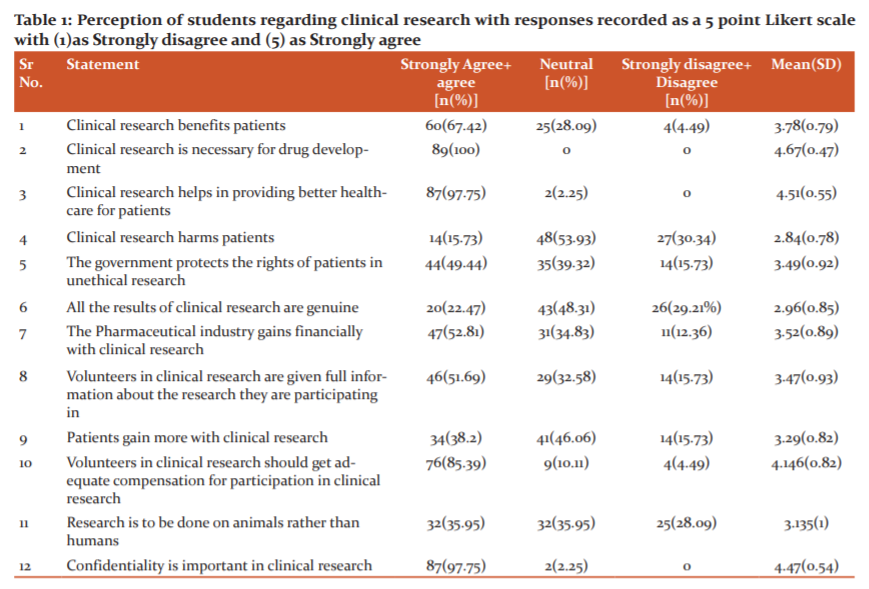
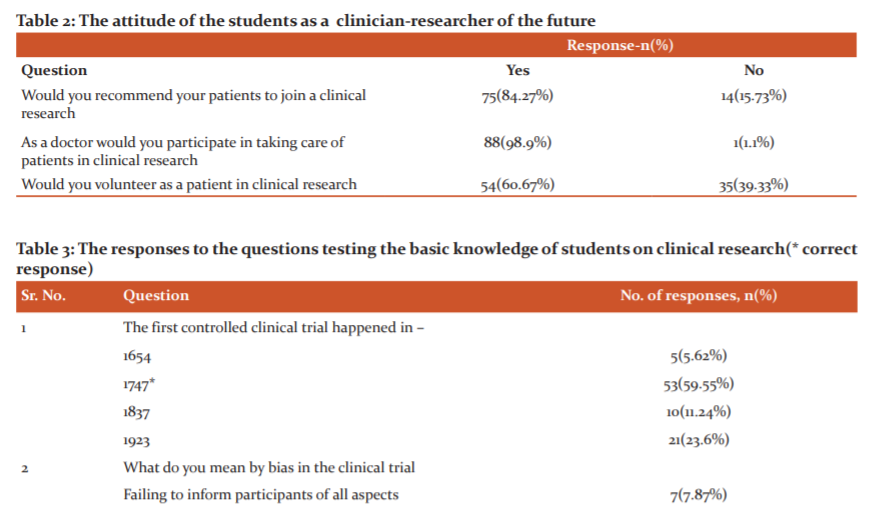
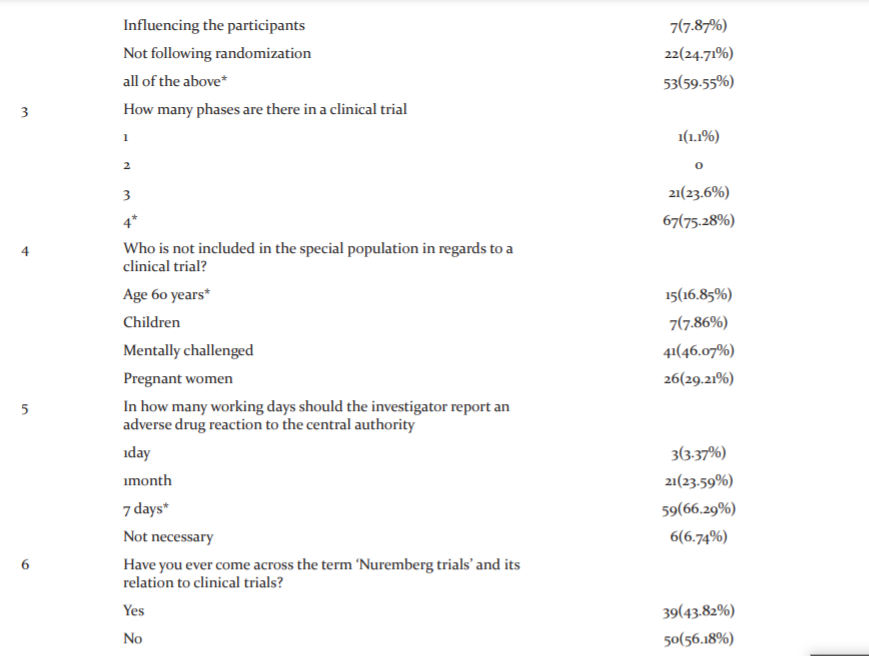
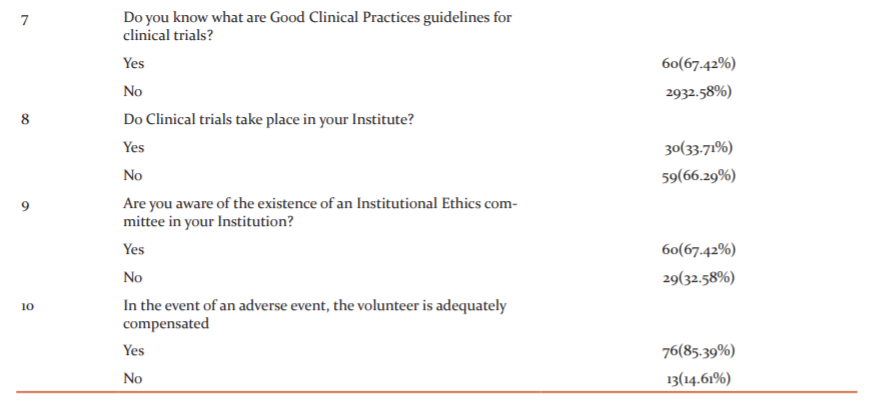
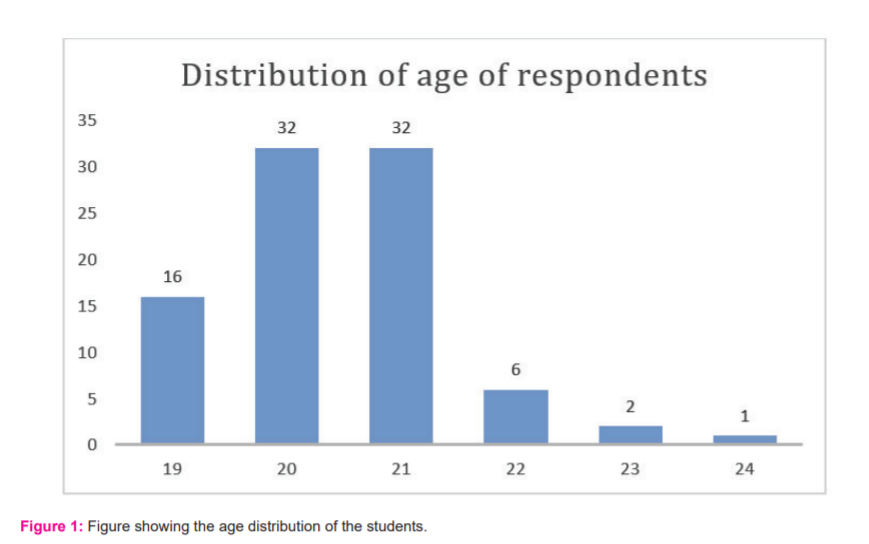
References:
-
Metcalfe D., Involving medical students in research, J R Soc Med. 2008;101(3):102-3.
-
Vodopivec, Ana Vujaklija, Maja Hrabak, Ivan Kres?imirLukiæ, AnaMarus?iæ, MatkoMarus?iæ, Knowledge about and Attitude towards Science of First-Year Medical Students, Croat Med J 2002, 43, pg. 58-62
-
Sandeep Sachdeva, Neha Taneja, Nidhi Dwivedi Knowledge, attitude and practices studies conducted amongst medical students of India, Int J of CMed and Pub H, September 2018;5(9):3913-3918
-
KAP survey model (Knowledge Attitudes and Practices).pdf,https://www.spring-nutrition.org/publications/tool-summaries/kap-survey-model-knowledge-attitudes-and-practices, accessed in December 2019.
-
Khan H, Khawaja MR, Waheed A, Rauf MA, Fatmi Z. Knowledge and attitudes about health research amongst a group of Pakistani medical students. Bio-Med Cen Med Edu. 2006;6(54):1-7.
-
Aslam F, Shakir M, Qayyum MA: Why Medical Students Are Crucial to the Future of Research in South Asia, PLoS Med. 2005;2: 11:1110-1111.
-
Priyadarshini M. Deodurg, Harish G. Bagewadi, B.V. Patil, Asha P. Dass, Knowledge, attitude & perceptions of 3rdterm medical students towards clinical trials in a medical college in southern India, Ind Jof Phar and Pharmac, July-Sep. 2017; 4 (3):125-129.
-
Althubaiti A., February 2015, Undergraduate Medical Research Programme: A Cross-Sectional Study of Students' Satisfactions, Perceived Challenges, and Attitudes. Glo J of HSci.2010;7(5):117–123.
-
Saraschandra Vallabhajosyula, Ranjitha S Shetty, Suma Nair, Knowledge, Attitude and Practice towards Medical Research among Students of a Medical College in Southern India, J of Res in Med Edu& Eth, July 2014; 4(2):220-225
-
Rajshree N. Mandhare, Venkatesh V. Khadke, Saleem B. Tamboli, (November 2019)Knowledge, attitude and practices towards medical research among resident doctors at a tertiary care hospital, Int J of Basic& Clin P. 2017; 8(11):2517 – 2522
-
Madhavrao C., Mythili Bai K., Rema Menon N., Sharath Babu K., Prathab Asir A. Knowledge, Attitude and Practices towards principles of research among medical postgraduates in a teaching tertiary care centre, Int J Cur Res Rev.2006; 8(2):1-6.
-
Pawar DB, Gawde SR, Marathe PA. Awareness about medical research among resident doctors in a tertiary care hospital: A cross-sectional survey. Per in Clin Res.2012; 3(2): 57–61.
|






 This work is licensed under a Creative Commons Attribution-NonCommercial 4.0 International License
This work is licensed under a Creative Commons Attribution-NonCommercial 4.0 International License